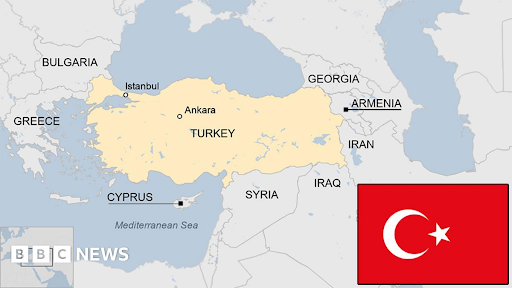



Pakistan’s use of Turkish-made Songar drones in cross-border attacks on India has heightened tensions. Turkey’s silence on terror attacks and condemnation of India’s counterstrikes show its tilt toward Pakistan. Despite strong trade ties, Turkey’s stance on Kashmir and military support to Pakistan strain India-Turkey relations and regional stability.

Copyright infringement not intended
Picture Courtesy: INDIANEXPRESS
Turkish-made drones linked to Pakistan’s recent cross-border attacks raise serious geopolitical and security concerns.
On the night of 8th May 2025, Pakistan launched an attack, sending 300–400 drones to target 36 locations across India, from Siachen in the north to Sir Creek in the west.
Indian forces shot down many of these drones using advanced defense systems. Forensic teams analyze the debris of the downed drones and find evidence that they are Asisguard Songar drones, manufactured by a Turkish defense company.

Songar drones, developed by Asisguard, a Turkish defense firm, are advanced unmanned aerial vehicles (UAVs) designed for combat. First introduced in 2019 and inducted into the Turkish military in 2020, these drones are versatile and deadly.
They come in various models, equipped with weapons like:
These drones operate at altitudes up to 2,800 meters and have a range of 3–5 kilometers, making them ideal for low-intensity conflicts.
They include advanced capabilities like real-time video transmission, autonomous takeoff and landing, and precise targeting through stabilized firing systems.
Deep defense partnership between Turkey and Pakistan, rooted in a Military Consultative Group established in 1988. Pakistan has acquired several Turkish weapons, including Bayraktar drones and Kemankes cruise missiles, with Songar being the latest addition.
Unlike other global leaders who condemn the Pahalgam attack, Turkey remains silent, refusing to offer condolences to India. Instead, it backs Pakistan’s call for an investigation into the attack, a stance India views as biased.
When India launches Operation Sindoor on May 7, 2025, striking nine terror sites in Pakistan and Pakistan-occupied Kashmir (PoK) in response to the Pahalgam attack, Turkey condemns India’s actions. It warns that India’s strikes risk an “all-out war,” aligning itself firmly with Pakistan. This differs with the G20 nations and other Gulf countries, which urge restraint from both sides or support India’s fight against terrorism.
Established diplomatic ties in 1948. During the Cold War, Turkey aligned with the Western Bloc (NATO), while India led the Non-Aligned Movement, limiting deep engagement.
Since the end of the Cold War’s end, both nations have actively worked to strengthen ties. Generally, their political and bilateral relations remain friendly. However, Turkey’s support for Pakistan, especially on the Kashmir issue, creates friction.
They signed a Bilateral Trade Agreement in 1973, followed by the India-Turkey Joint Commission on Economic and Technical Cooperation (JCETC) in 1983.
Bilateral trade reached USD 10.7 billion in 2021-22, with India exporting USD 8.7 billion and importing USD 2 billion. In FY24, trade slightly dipped to USD 10.4 billion, with India’s exports at USD 6.66 billion.
Must Read Articles:
Source:
|
PRACTICE QUESTION Q. Critically analyze Turkey's stance on the Kashmir issue and its implications for India-Turkey bilateral relations. 150 words |





© 2026 iasgyan. All right reserved